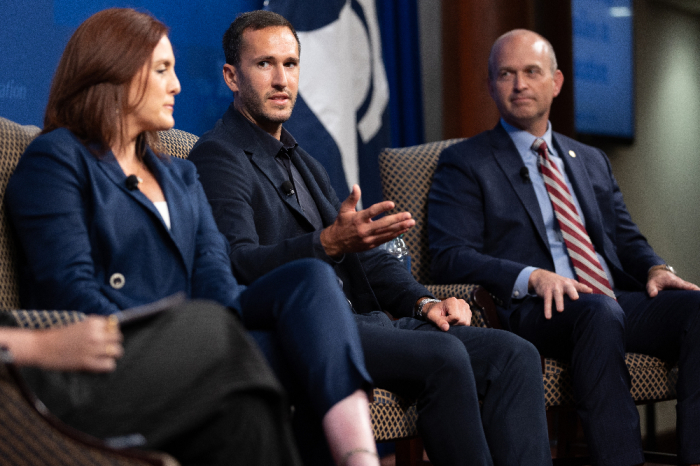Lack of transparency, dismissive teachers the ‘breaking point’ for parents, school choice advocates say

WASHINGTON — The school choice movement is growing rapidly amid ongoing discontent from parents who find themselves at odds with public school officials over a lack of transparency and other issues, school choice advocates say.
The conservative think tank Heritage Foundation hosted a panel discussion at its headquarters on Monday, featuring co-founder of Moms for Liberty Tiffany Justice, longtime school choice advocate Corey DeAngelis and Heritage President Kevin Roberts.
The panelists spoke of empowering parents in education amid recent changes in the political landscape, accentuated by COVID-19 pandemic policies, the antics of prominent teacher's unions and ideologically-motivated teachers.
Justice told The Christian Post that she believes many parents have recently developed a sense that school boards are not respecting their rights as parents, especially when they express concerns with teachers and administrators.
"And they said: 'Wait a second, I thought we were partners in our children's education,'" she said, describing the thinking of many parents who felt alienated by school officials.
"That, I think, was the breaking point for a lot of parents. They just said, 'Enough! This is ridiculous, and we have to save our kids.'"
Not every parent has the means to withdraw their children from public schools, she continued, thus necessitating the creation of other options for parents to direct the education of their kids.
Several states have moved toward a more of a "tax-dollar-follow-the-student" approach instead of investing more funding in a public system that critics say yields poor outcomes, they said.
In July, Arizona adopted the most robust school choice law in the nation that ensures all K-12 students in the state are eligible for scholarship funds. Families who participate in the program can receive over $6,500 per year per child for private school, homeschooling, micro schools, tutoring, or other educational services outside the public school system.
Florida, Iowa and Texas are also trending in that direction, panelists noted.
DeAngelis, the executive director at Educational Freedom Institute, expressed his support for the work of some state legislatures who have been considering bans on polarizing classroom content, such as critical race theory.
He warned, however, that videos from the group Accuracy In Media have emerged showing teachers apparently refusing to follow such laws where they have been enacted.
"They're catching people with undercover journalism, the administrators and teachers saying 'yeah we have a ban, but I'm just going to call CRT social-emotional learning,' or 'I'm just going to call it student mental health,' and we're going to incorporate the concepts even if it isn't explicitly in the curriculum," DeAngelis said.
Even if the bans work, he continued, "it's only a piece of the puzzle" and that "school choice also has to be a part of that as a last resort, if things aren't actually changing on the ground."
Wherever there was a lack of transparency in the schools is where parents had a breaking point, according to Roberts.
"And that's a lesson about something larger, which is that as Leviathan has accrued power in the imperial city of Washington and in the increasing number of imperial state capitals, parents realize — people realize — that part of accruing power is not having transparency," the Heritage president offered.
"It is the first step in breaking that power because as soon as rational people, which is the vast majority of the American people, see that, they want to take action."
In an interview published in City-Journal Tuesday, Arizona Gov. Doug Ducey said he believes the COVID-19 pandemic changed everything regarding K-12 education.
"Parents were able to see what their children were being taught via Zoom videos. They were also able to see the lack of rigor and expectation in these classrooms. They saw this pervasive CRT that's been discovered in so many different districts. And parents were rejecting that, along with the heavy-handed mandates around vaccines and masking, while they saw little to no focus on math, reading, science, character formation, or American civics," Ducey said.
"We had a lot of parents who were not politically engaged or had been sitting on the sidelines, saying, 'I want to have a say in what happens in my children's education.'"
Parental involvement in education was a significant issue during the 2021 Virginia gubernatorial election, in which Republican Glenn Youngkin defeated Democrat challenger Terry McAuliffe.
McAuliffe faced backlash after a gubernatorial debate for saying, "I don't think parents should be telling schools what they should teach."
Exit polling showed that Virginia voters who viewed education as the most important issue facing the state favored Youngkin over McAuliffe, 53% to 47%.
Additionally, 77% of voters who wanted parents to have "a lot" of say in what public schools teach children supported Youngkin, while only 22% favored McAuliffe.
One place where this debate was intense was the Washington suburb of Loudoun County, Virginia, which became a bastion of parental backlash over school board policies that included allowing students to use the restroom and locker room of their chosen gender identity, irrespective of their sex.
Earlier this year, the Heritage Foundation held an event featuring a panel of mothers who, in various ways, were resisting gender ideology in the public school system.
Send news tips to: brandon.showalter@christianpost.com Listen to Brandon Showalter's Life in the Kingdom podcast at The Christian Post and edifi app Follow Brandon Showalter on Facebook: BrandonMarkShowalter Follow on Twitter: @BrandonMShow





























